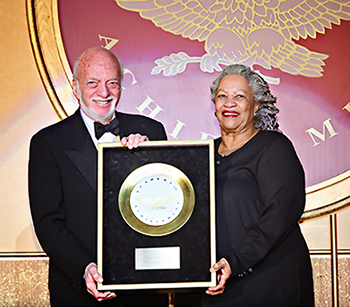Theater director, producer, and impresario Harold “Hal” Prince died last week at the age of 91. Prince, who came from a German Jewish family, was involved in numerous Broadway and off-Broadway productions. Many of his shows had Jewish themes, connections, or stories, most famously Fiddler on the Roof, which Prince produced in 1964. Prince also directed and produced Cabaret, about a seedy nightclub in late 1930’s Nazi Germany, which included a sub-plot about the relationship between a German boarding house owner and her suitor, a Jewish fruit vendor. What show that Hal Prince was involved in originally had a Jewish-themed plot that was changed before the show was ultimately produced?

Harold Prince receives the Golden Plate award from Toni Morrison is in the public domain.
A. In 1955, Prince was a co-producer of the show Damn Yankees, about a long-suffering Washington Senators fan who couldn’t stand seeing the New York Yankees constantly beat his beloved team. The man, Joe Boyd, made a deal with the devil to become Joe Hardy, a young power hitter who led the Senators to victory. This show originated as Damn Yekkes, a story about a poor Litvak immigrant from Vilnius who hated the rich German Jews who he worked for at a shmatte factory on the Lower East Side of New York. He made a deal with the devil that enabled him to become a wealthy Yekke, whereupon he opened a shmatte factory across the street from his employer and drove that “damn Yekke” out of business.
B. The musical Company was produced and directed by Prince in 1970. The show, with music and lyrics by Stephen Sondheim, focuses on a young man named Robert, who is surrounded by his married friends and his three girl friends. The issue of being single vs. being married is explored as Robert’s friends throw a party to celebrate his 35th birthday. In its earlier incarnation, the plot of Company was about the single life of Robert, but originally, he was surrounded not by his friends, but by his parents, grandparents, aunts, uncles, and even his rabbi, all of whom constantly “hocked” him to get married and produce grandchildren. The song Another Hundred People with the opening lyric line “Another hundred people just got off of the train” was originally written for Robert’s mother, who sang “Another hundred friends of mine are bubbies again.”
C. One of Hal Prince’s many collaborations with Stephen Sondheim was on the show A Funny Thing Happened on the Way to the Forum, which Prince produced in 1962, with Sondheim writing the lyrics and music. Forum is about a slave named Pseudolus who attempts to win his freedom by helping his master woo a pretty young woman. The show originated as A Funny Thing Happened on the Way to the Temple, about a young Jew named Shikkerlus who attempts to convince the High Priest at the Temple to hire him to guard the stash of sacrificial wine. The show featured an earlier version of the opening number, A Comedy Tonight, as follows: Something farblondjet/Something for gornisht/Something farshtinkener/Meshuggenehs tonight./Something farchadat/Something farpotshket/Something farbissiner/Big mishegoss tonight!
D. One of Prince’s biggest successes was West Side Story, which he co-produced in 1957. The play is a musical about the rivalry between Puerto Rican and white street gangs in New York, and the tragic love story of Maria and Tony, based on Shakespeare’s Romeo and Juliet. Before Prince became involved in this project, the show was originally called East Side Story, and it took place during the Easter/Passover season. The plot revolved around rival Catholic and Jewish gangs, and the tragic love story of a Lower East Side Holocaust survivor, Tante, and an Italian gang member from Greenwich Village.
E. In 1979, Prince directed the musical Sweeney Todd: The Demon Barber of Fleet Street, about an evil barber who kills his clients by slitting their throats with his shaving razor, after which Sweeney Todd’s friend Mrs. Lovett bakes the bodies into meat pies. The show was originally written as Shloime Cohen: The Demon Mohel of Kraków, about a rogue mohel who performed circumcisions on unsuspecting customers. Without being more specific about what happened next, suffice it to say that the show closed quickly after failing to receive Kashrut certification.
